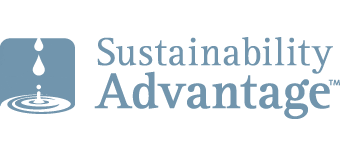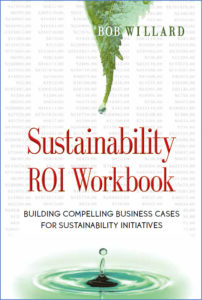PROJECT-LEVEL BUSINESS CASE
“Senior leaders and decision-makers in business need to see a rigorous cost-benefit analysis, and a projected payback period with return on investment, before approving any major capital investment – and this includes sustainability initiatives. The “Sustainability ROI Workbook” frames the business case for environmental and social initiatives. It is a useful tool that provides key metrics for use in decision-making and helps to demonstrate how sustainability initiatives help businesses create financial value.”
– Gordon Beal, Vice President – Research, Guidance and Support, Chartered Professional Accountants of Canada (CPA Canada)
The Sustainability ROI Workbook is a “book” cleverly disguised as an Excel workbook. It is a tool that helps build a business case for any sustainability-related project. The comprehensive, fill-in-the-blanks Excel workbook is the book.
Watch this clever, short, animated video by Sustainability Illustrated for a quick overview of the workbook: The Sustainability ROI Workbook.
CFO-friendly
When seeking Chief Financial Officer (CFO) approval for a sustainability-related project, proponents need to ensure that their proposal includes cost-benefit information required in a standard capital expenditure (CAPEX) request. The workbook includes the traditional return on investment (ROI) financial analysis of costs and benefits ― hence, its title. Plus, it includes a Project Appraisal Tool that helps CFOs make better-informed resource allocation decisions in the more turbulent 21st century business environment.
Sustainability champion-friendly
The workbook helps users identify, quantify and monetize all potential direct and indirect costs and benefits associated with a sustainability project.
- Superset of potential benefits: Users are prompted to estimate how their project directly or indirectly contributes to over 25 possible benefits from sustainability projects.
- Sample project: The tool includes a sample project that illustrates how the calculations work and the worksheets interact. Users replace the example text and data with their project’s information.
- Just-in-time explanations and guidance: Dozens of just-in-time, pop-up comments provide guidance on how to estimate requested information. Examples of other companies’ experience with a line item are also available in the Sustainability Business Cases Master Slide Deck.
- Automatic ROI calculations: The workbook automatically does the return on investment (ROI) calculations for the project: its payback period, the internal rate of return (IRR), and the net present value (NPV) of its future cash flows.
- Includes risks of not doing the project: In addition to quantifying potential risks associated with doing the project, the workbook monetizes over 25 potential risks of not doing the project.
To expedite its use by the global legions of sustainability champions, the Workbook is a self-published, free, open-source resource. Users are encouraged to create tailored versions for specific sectors, users, other technology platforms, other languages, etc. To access the workbook, click here. You can do this an unlimited number of times.
There are a couple of companion tools that may also be of interest. They were originally in appendices in the workbook, but have been removed and saved here for those interested in these supplementary resources:
Feedback: The tool is being continuously improved. Your suggestions are welcome. Please send your ideas to bobwillard@sustainabilityadvantage.com. Thanks.
Updated Employee-Related Benefit Calculations
My good friend Panos Panagiotakopoulos is an AI guru and expert in both sustainability and organizational AI adoption. In June 2025, following a casual conversation with a senior executive at an event, he had occasion to recalibrate the potential employee-related benefits of sustainability initiatives. Panos used Google’s Gemini to generate three things:
- Re-Quantifying Sustainability’s Employee-Related Benefits: This 17-page report builds on the original findings as documented in The New Sustainability Advantage book (2012) and Sustainability Business Case Master Slide Deck. Gemini researched more current articles and reports to do a comprehensive summary of the potential employee hiring and attrition savings, and increased employee productivity benefits, associated with an organization’s sustainability-related efforts. Its 34 endnotes point to excellent backup sources for all its claims.
- The $58 Million Employee Advantage: Quantifying People-Powered Sustainability: This 5-minute voice-only podcast summarizes the above report in a succinct podcast format.
- The Human Capital Advantage: This online calculator allows users to use sliders to plug in their parameters and see the potential conservative, average and optimistic employee-related benefits arising from an organization’s sustainability initiatives.
The most amazing thing, at least to me, is that Panos used Gemini to create the report, the podcast, and the calculator all in about 15 minutes.
Project-level business case slides
Master – Sustainability Business Cases slide set is one of six slide decks available to Master Slide Decks subscribers. It includes an overview of the project-level business case and backup on the potential opportunities that could be captured and risks that could be avoided if the company were to implement the sustainability project. The deck is updated quarterly.


